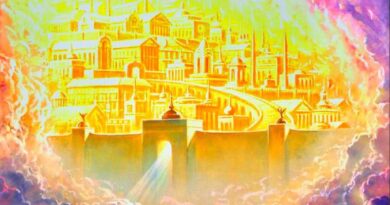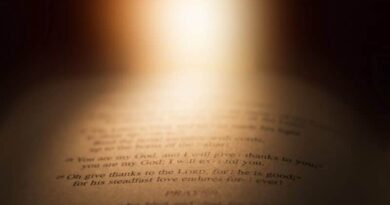How Can a Holy God Create Evil?
| “I am Yahweh, and there is none else. I form the light, and create darkness: I make peace, and create evil: I, Yahweh, do all these things.” – Isaiah 45:6, 7 |
| __________________ |
| “Holy, holy, holy, is Yahweh of hosts” sang the seraphic angels of God as recorded in Isaiah 6:3. The prophet Habakkuk said of Him, “Thou art of purer eyes than to behold evil, and canst not look on iniquity.” (1:13) How, then, ponder men of faith, can a Holy God create evil as the passage from Isaiah quoted above says He does? A casual reading of the problematic passage has led to strange conclusions. Some have concluded that God has outrightly created Satan the devil and/or demons as evil personages.[*] Others have suggested that if God can create evil, there are no literal evil spirits or devil; but that, in the Bible, these are figures of speech or personifications of evil. We ask again, how can a Holy God create evil? First one must realize that the passage was originally written in Hebrew and then translated into English. As Christians we believe that the passage in Isaiah was inspired by God and totally true. But we also realize that the English reading is an uninspired rendering of imperfect men. Could the selection of terminology be less than accurate for the modern reader? Before we examine the offending term more closely, let us examine its opposite given in the same passage, “I make peace.” The Hebrew term translated as peace is shalom. Commentators will readily admit that this English word is far narrower in meaning than the Hebrew. Actually our phrase peace and prosperity comes much closer. We are led to ask, does the Hebrew term rendered evil carry a broader spectrum of meaning than the usual connotation of the English term? The Hebrew term translated evil is rah. It can mean bad or evil, whether natural or moral. Other English words that could be used to render this term are adversity, affliction, or calamity. A natural disaster such as an earthquake is rah, but it is not morally evil. As the Bible well attests Yahweh can bring prosperity upon those whom He chooses, and disaster upon those whom He wills. As judgment acts, these disasters certainly are rah for those on the receiving end, but they are acts of God’s righteousness, and cannot be said to be morally evil. But what about moral evil, did God create it? If God actually created moral evil, then would He not be morally responsible for the evil committed? Logically, yes. Is there a way in which it can be said that God created moral evil without making Him morally responsible? Let’s take a look at the issue from this viewpoint. To help us understand, we need to examine the preceding line of this verse, “I form the light, and create darkness.” Darkness exists in the absence of light; it does not have or need a source. Light on the otherhand must have a source. Without the existence of light darkness would be all pervasive, yet indefinable. We need a contrast to truly comprehend the concept. With this being the case, one may wonder at the contrary construction of this passage. If natural light and darkness are being referred to here, one should find the passage reading: I create the light, and form darkness. However, God is talking about spiritual light and darkness, so the above phrasing is correct. God Himself is the source of spiritual light, and since He is uncreated, it would be incorrect to say that He created spiritual light; it has always existed with Him. How, then, does He create spiritual darkness? By defining spiritual light, that is, by saying what it is and what it is not. The same is true with shalom and rah. He is the source, the very personification of shalom. Therefore, it would have been incorrect to say that He created it as it has always existed with Him. But by giving definition to shalom, He creates rah. This is true even when we move these terms to the moral sphere. Paul helps us to understand this with a couple of passages in Romans, “…where no law is, there is no transgression.” (4:15) “…I had not known sin, but by the law: for I had not known lust, except the law had said, Thou shalt not covet. But sin, taking occasion by the commandment, wrought in me all manner of covetousness. For without the law sin was dead. / Wherefore the law is holy, and the commandment holy, and just, and good.” (7:7, 8, 12) God, by defining what was holy, just and good, created evil, yet without being morally responsible for it. Consider: If murder is not defined as a crime, then a murderer is not a criminal. If covetousness is not defined as a sin, then a person who covets is not a sinner. By giving a standard of what is right, God has created that which is wrong. But God’s creation of evil does not stop here. To His intelligent creation He has given free-moral agency.[†] By creating a situation whereby moral evil can come into the world, He effectually created it, though He Himself created no evil personages nor commits any evil acts. What He has done is created free-moral agents, given them a standard of good and evil, and allowed them to respond as they freely choose. In these ways Yahweh God has created evil, yet has Himself remained holy. NOTES: [*] As opposed to the more commonly held belief that Satan and evil spirits are angels that were created good but chose to take a rebellious course. [†] Some Christians include angels in this; others do not. |



